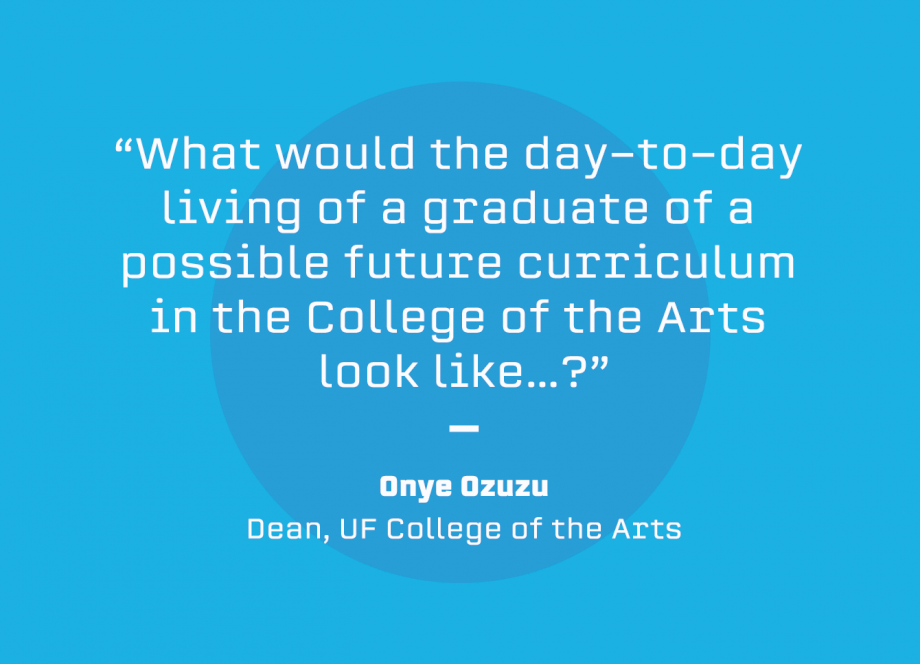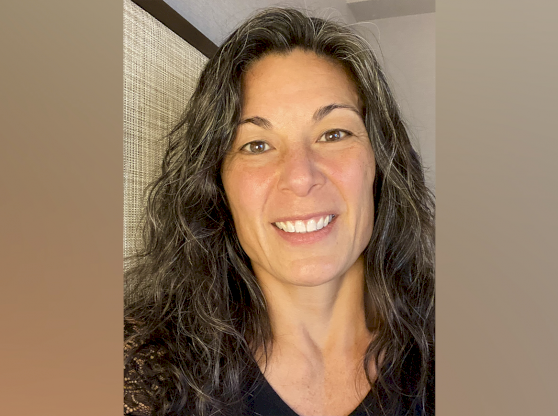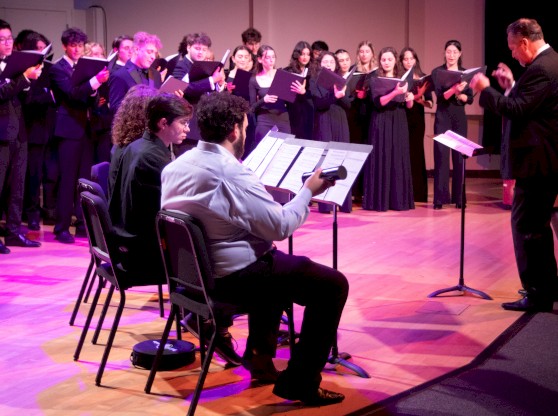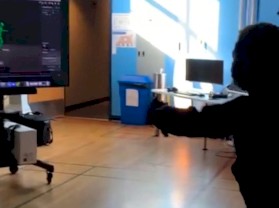A couple of weeks ago I spent some time with the School of Music faculty. In our discussion, one faculty member asked me a question about vision, in the context of new curriculum development. The question has stayed with me, I think largely because of the evocation of the idea of sight. What would it look like? I found myself turning the question in my mind: What would the day-to-day living of a graduate of a possible future curriculum in the College of the Arts look like, one that is threaded together by mapped and intentional learning outcomes that build out to a value-based and reciprocal relationship for artists with and in society?
The question has generated a hopeful series of images for me as we have embarked on these first few weeks of the academic year, and I thought I might share. I have also asked a few other faculty members to join in my speculative visioning to see how they might imagine the life of a graduate of a future College of the Arts alumni of the University of Florida. Their responses to the question will be released in our new mini-podcast series, Know Nothing. Stay Curious!, coming soon to a social media location near you.
I imagine our future alumnus waking up in their bed in a historic and creatively generative city like Nashville or New Orleans, or Oakland. He is a musician, in town for a gig, a violinist, a mentee of Dr. Janna Lower. He is playing a concert at the end of the week, but he thought he would come early, work the week from here, and spend time exploring.
He is staying in a 3-D printed tiny house right in the cobblestone street district. He often stays in these small, exclusive, creative industry residency sites around the nation. I imagine our future alumnus might have booked his stay using an app somewhat derivative of our current Airbnb apps, but one that he is able to pay for using credits that he’s built up in a system that was the result of research into international orange economies (the term first coined by Felipe Buitrago Restrepo and Iván Duque Márquez in their work The Orange Economy: An Infinite Opportunityprepared for the Inter-American Development Bank). While our alumnus was at UF, he often attended classes offered by guest makers in residence with the Center for Arts, Migration, and Entrepreneurship whose work embodied the power, productivity, and change-making potential of orange economies. Orange economies came to refer to the many ways in which the creative industries boost economic activity and led to a mapping of cultural production in measurable quantitative and AI trackable ways. They allow artists, like our alumnus, to build up credits in the system based on place-specific performances in parks and subway stations or self-recordings from the balcony of their residence. This is exactly what I imagine he does this morning, of course, after his morning coffee and his augmented “warm-up” with a haptic suit / motion capture and AI-assisted technology fine-tuned to his somatic states and in reference to both his current practice goals and to the demands of preparing for his upcoming performance at week’s end.
And the days of his week go on like this, in a modular series of appointments that his portable artistic entrepreneurial profile facilitates for him. He is scheduled by a local arts and health concierge for a couple of sessions with Alzheimer's patients at a local senior center and is grateful for his arts and health certificate that prepared him to participate in these rewarding engagements that bring so much well-being to his clients. He is connected to a local federal “Arts Desk,” that schedules him to play as an accompanist for a baby and parent creative movement session in a museum’s sculpture garden. The program spun off from the post-COVID arts-facilitated recovery programs that built a research base for policy and programs that now support sustained art for public health across the nation (another hat tip to his alma mater and the groundbreaking work of the Center for Arts in Medicine).
His most populated meeting of the week is an AR conference session with a grant-funded research project. The project is a component of the post- Black Lives Matter / defund the police focused social action of the summer of 2020. After the controversial call to action, the work evolved into the more focused and pragmatic process of reducing the pressure and workload on police and facilitating their success by diversifying the ways that we cultivate peace in our social contexts. Our alumnus is working on a project that is gathering data about the impacts of music on public spaces. He is one of hundreds of performers who will play in order to facilitate the gathering of qualitative and quantitative data to test if musicians can predictably contribute to a reduction in conflict in public space. The launch of a data-gathering project for public space performance at that meeting allows for his rehearsal the next day, an improvisational session with local flamenco dancer and guitarist that he knew from back in his days in Gainesville to do triple time as a generator of credits in his orange economy account as well as a generator of data to contribute to the research project and the beginning of a new collaboration and direction for his own creative work.
So, in a week away from home, our future alumnus fills his hours with a diversity of creative activity that intersects with public health, healthcare, public safety research, and networking and creative research for his own future projects. He has ample time to explore the creative and cultural aesthetics of the city he is visiting. His basic needs are met in keeping with his ongoing and acknowledged production of value as a creative. Between coffee shops and senior citizen centers, rehearsals in the parks, excellent food, sights, and sounds, our alumnus experiences, absorbs, and offers his way to a culminating performance with the city symphony orchestra’s presentation of Dr. Scott Lee’s work The Last Best Place and Jessie Montgomery's Shift, Change, Turn, and Variations.
Onye Ozuzu is the dean of the University of Florida College of the Arts.



